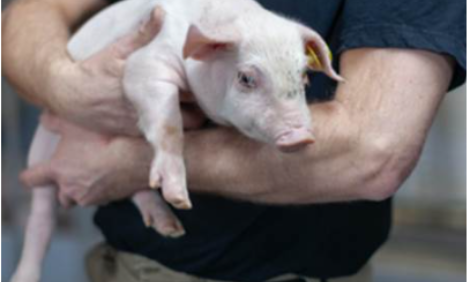



Mannan Oligosaccharides Offer Health Benefits to Pigs
Feeding mannan oligosaccharides (MOS) can fine-tune the immune system of pigs against PRRS, suggests a new University of Illinois study."When it comes to keeping pigs healthy, there are some potentially powerful tools we can use in the diet besides antibiotics," said James Pettigrew, University of Illinois (U of I) professor of animal science. "We have a tendency to think that we can administer health through a needle, by giving pigs antibiotics, and even through systems like all-in/all-out pig flow. These are important, but there are also many health benefits we can realise through the diet."
MOS is a product made from the cell wall of yeast. It contains carbohydrates that may provide special benefits, Professor Pettigrew said. Previous research showed that it increased the growth rate in newly weaned pigs and changed the microbial populations in the digestive tract.
Tung Che, a postdoctoral research associate in Professor Pettigrew's laboratory, led two studies looking at MOS and its effect on pigs experimentally infected with porcine reproductive and respiratory syndrome virus (PRRSV).
In these studies, researchers evaluated how feeding MOS can modulate immune responses in pigs infected with PRRSV.
"We found MOS can enhance immune responses in pigs, but it can also alleviate the over-stimulation of the immune system," Dr Che said. "MOS increases the total number of immune cells such as leukocytes and lymphocytes in the blood at the early stage of infection."
This could be quite a benefit for producers fighting PRRSV, a respiratory disease that causes a reduction of immune cells.
"This is important because the increase in leukocytes and lymphocytes can help the animal to fight not only PRRSV, but also secondary bacterial co-infections that are common with PRRSV," Dr Che said.
Seven days after this PRRSV inoculation, pigs experienced a reduction of fever and had a better feed efficiency, indicating a reduction of ongoing inflammation.
"We wanted to find out why MOS enhances the immune system, but at the same time alleviates the overstimulation of the immune system as observed by reduced fever," Dr Che said. "So we collected white blood cells and measured gene expression by using a broad microarray technique followed by the more specific quantitative polymerase chain reaction (qPCR)."
The results were consistent with the clinical signs and showed that in non-challenged pigs, MOS increased the expression of genes for cell receptors and those involved in immunity. However, in the PRRSV-infected pigs, MOS reduced the expression of cytokine and chemokine genes involved in inflammatory responses. This combination of responses explains the enhanced immune response and the reduction of fever, Dr Che said.
"MOS stimulates the immune system and enhances the immune response, except when the immune system is already challenged," Professor Pettigrew explained. "MOS actually reduces the inflammatory response in pigs with challenged immune systems. This may be how the product improves growth performance because it redirects nutrients to growth rather than the immune system."
Dr Che said MOS also improves feed efficiency from Day 7 to 14 after inoculation with PRRSV.
"PRRSV interferes with the immune response and makes pigs more susceptible to bacterial infections," Professor Pettigrew said. "This product seems to counteract this effect. It may even reduce bacterial infections associated with PRRSV, although we did not test that specifically."
This team of researchers is also repeating this experiment with a second generation of MOS-like products to learn more about how this mechanism in MOS works.
"We are increasingly concerned about the importance of keeping pigs healthy, so we direct much of our research program to looking at things we can do in the diet to improve the health of pigs," Professor Pettigrew said.
'Mannan oligosaccharide modulates gene expression profile in pigs experimentally infected with porcine reproductive and respiratory syndrome virus' and 'Mannan oligosaccharide improves immune responses and growth efficiency of nursery pigs experimentally infected with porcine reproductive and respiratory syndrome virus' were both published in the Journal of Animal Science.
Further Reading
| |
- | Find out more information on porcine reproductive respiratory syndrome (PRRS) by clicking here. |
July 2011








